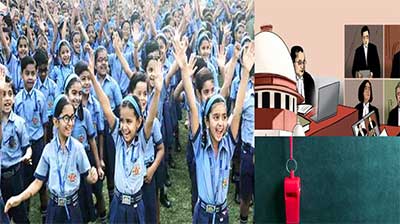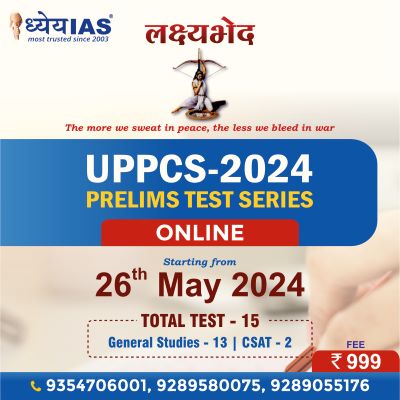Relevance: GS-2: Indian Constitution—Historical Underpinnings, Evolution, Features, Amendments, Significant Provisions and Basic Structure
Key Phrases: Article 21A, Physical literacy, Olympic Charter, human right, inclusion.
Why in News?
- Senior Advocate of Supreme Court filed a plea, seeking directions to the Union Government to form a High-Level Committee to make suggestions on amending Article 21A to include Sports as a Fundamental Right.
- He had observed in the report filed by him that it is better to adopt an all-encompassing phrase "Physical literacy" instead of the narrower phrase "Sport".
- He claimed that the ambit of physical literacy being too broad would include yoga and other activities which are in essence not sports.
- Apart from seeking direction to include Sports into the ambit of Article 21A, the petition also seeks to include a DPSP in this regard, which provides that "State shall strive for promotion of Sports education, sports values and sports culture as part of education".
Meaning of Fundamental Right to Physical Literacy:
- The report states that having fundamental right to literacy would mean identifying the intrinsic value of physical activity to human living.
- It would mean not seeing physical activity as a means to an end and establishment of physical activity/ physical education as a core component of education curriculum.
- Further, it would mean life-long opportunities to access physical activity universally, and everyone no matter their age, ability, gender, class or other needs or interests, demands the right to be physically active and physically literate.
Report Recommendations:
- The report which has been submitted in the court has listed following
recommendations:
- Sports to be transferred to the 'Concurrent List' for cooperative work between Centre and State;
- Develop a 'Fund Bank for Education and Sports Facilities';
- Form an independent "Ministry of Education, Sports and Youth Empowerment" at Union and State level;
- Direct Union and State Governments to amend curriculum from Nursery to Secondary levels, even in Sanskrit Schools and Madrassa, to promote sports;
- Free distribution of sports kits by Governments across the board;
- Sports facility & playground at village and school level;
- Teaching sports as a full time subject in schools;
- Making compulsory provision for Sports in school budget, and
- Appointing a Nodal School in each District to provide facilities, train students and organize events/workshop.
- The Policy mentioned in report will include the institution's
commitment to a 'no-child-left- behind' approach that ensures
that the institution's physical literacy activities are designed and
delivered in a manner that is
- Inclusive of students with physical and mental disabilities, girls, students from marginalized economic and social groups and
- Integrates each student into the activities that all students participate in and does not classify, separate and alienate them based on perceived merit, skills or abilities.
- Directions to Digital Initiatives: Directions to the MeitY supported by NITI Aayog to create a dashboard with real time data on mapping of available playgrounds and open spaces and their utilization rates, availability and qualifications of PE teachers, curricula, timetables, and equipment in educational institutions across the country.
International Conventions and Organizations:
Sports touches upon many human rights aspects and international conventions concerning human rights. Some of the international conventions related to human rights in sports are:
- The Olympic Charter:
- The Olympic Charter was codified in the year 1908 and it is the compilation of rules, fundamental principles, and bylaws that establish and regulate the International Olympic Committee and its other subsidiaries.
- The Fundamental Principles place sports in the broader context of community, culture, humanity, and declare sports as a human right.
- UNESCO International Charter of Physical Education, Physical Activity
and Sport:
- During the 38th Session of the UNESCO (United Nations Educational, Scientific, and Cultural Organization) General Conference on 18th November, 2015 the International Charter of Physical Education, Physical Activity and Sport was adopted.
- This charter states that “the practice of physical education and
sport is a fundamental right for all.”
- Article 1 of the Charter recognizes the practice of physical education, physical activity, and sport as a fundamental right of all the people.
- The United Nation Office on Sports for Development and Peace:
- The main objective of this office is to promote the sport in a systematic and coherent way as a means to contribute to the achievement of development and peace. It has implemented many strategies to foster the development of the sport, especially of youth.
- Centre for Sports and Human Rights:
- The Centre for Sports and Human Rights was established on 25th June, 2018 at Geneva. This is the main center for promoting and protecting human rights tied to sports.
Conclusion:
- The protection of human rights in regard to sports need to be given significant attention as sport is that practice by which people learn various values such as fairness, equality, perseverance, team building, inclusion, respect, and discipline that cross nationality, gender, physical condition, or age.
- Sports have contributed to the well-being of the person regardless of age, gender, or ethnicity. It has become paramount to build stronger bridges to advocate, pledge, and promote sport as a human right.
- When it comes to sport everyone practices it without any kind of discrimination such as nationality, sexual orientation, social origin, race, language, color, property, birth, sex, or any other status.
Sources: Live-Law India Today
Mains Question:
Q. Recently a plea is filed in Supreme Court for making sports a fundamental right. In light of this discuss the important recommendations of the report for making sports a fundamental right and also mention the international conventions to support your answer?



















